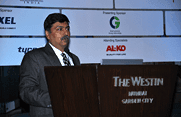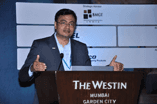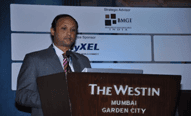Lnoppen & BMGI conducts 3rd India Hotel Expansion Summit 2013
 BMGI as the Strategic Advisor and Shanghai based Lnoppen, conducted the 3rd India Hotel Expansion Summit 2013 at The Westin Mumbai Garden City on 29th & 30th August 2013. The event had a representation of Senior Industry leaders (across the value chain) including Starwood Group, Marriott International, Holiday Inn, Concept Hospitality, Svenska Design Hotels, Keys Hotels, Berggruen Hotels, Sahara Hospitality, Crompton Greaves, Fern Hotels, AL-KO Therm to name a few.
BMGI as the Strategic Advisor and Shanghai based Lnoppen, conducted the 3rd India Hotel Expansion Summit 2013 at The Westin Mumbai Garden City on 29th & 30th August 2013. The event had a representation of Senior Industry leaders (across the value chain) including Starwood Group, Marriott International, Holiday Inn, Concept Hospitality, Svenska Design Hotels, Keys Hotels, Berggruen Hotels, Sahara Hospitality, Crompton Greaves, Fern Hotels, AL-KO Therm to name a few.
The event was flagged off with forethoughts on the trends observed in the “Indian Hotel Industry”by Mr Naresh Raisinghani, CEO & Executive Director, and BMGI’s India Office. He discussed the macro trends of growing Foreign Tourist arrivals and domestic Visits in light of the increasing Available Rooms and current occupancy rates. Mr Raisinghani discussed the challenges of development costs, capacity expansion, skilled manpower and business seasonality faced by the industry.
He also identified key enablers that led the growth for Business such as Domestic & Foreign travelers, MICE tourism, development of new cities and increased GDP per capita in Tier 2 & Tier 3 cities. In defining the value proposition he stated the need to create “Customer Distinction” in terms of differentiation for attracting new customers, Standardization balanced with familiarization creating customer loyalty and Customization for creating different customer experiences for varied segments”.
Ms Benaifer Jehani, Director – Customized Research CRISIL provided insights on the Industry outlook and the Road Ahead. She discussed the new oversupply situation at certain locations in the Premium Hotels segment. It was also highlighted that REVPAR growth will be marginal (premium) or flat (business) and increased competition will lead to stable ARRs. Revenue Growth has been subdued to 4-5% with increased operating costs (employee and energy costs). Concurring with Mr Raisinghani, she also highlighted significant growth in Tier 2 & Tier 3 cities in the last year. She also shared an interesting concept of using RevPAR to calculate the construction cost per room.
 “Walk the talk to deliver results” said Mr Anuraag Bhatnagar, Area General Manager-Westin Hotels. In light of where a brand should expand he highlighted the situation of hotel investments made in the branded segment leading to an oversupply situation. He segregated and discussed 2 market segments “The Developed” and “The Developing”. In the developed markets aspects such as increase in footfalls, cost of capital, visibility, right partnership and Rev Par are key parameters for making a decision. Supporting Mr Raisinghani he also stressed the potential of select Tier 2 cities in the midmarket and budget hotels segment due to increased GDP per capita in these locations.
“Walk the talk to deliver results” said Mr Anuraag Bhatnagar, Area General Manager-Westin Hotels. In light of where a brand should expand he highlighted the situation of hotel investments made in the branded segment leading to an oversupply situation. He segregated and discussed 2 market segments “The Developed” and “The Developing”. In the developed markets aspects such as increase in footfalls, cost of capital, visibility, right partnership and Rev Par are key parameters for making a decision. Supporting Mr Raisinghani he also stressed the potential of select Tier 2 cities in the midmarket and budget hotels segment due to increased GDP per capita in these locations.
 Mr Sarang Bodhankar, Senior Manager – Marketing Crompton Greaves shared interesting facts on “Next Generation Lighting for the Hospitality Industry”. He stressed on the importance of lighting in creating a distinctive and welcoming ambience for the consumer. With the availability of “green lighting” options such as LED and a suite of end to end lighting management solutions he emphasized on the possibility of reduced energy costs backed by increasing awareness and adoption in the industry.
Mr Sarang Bodhankar, Senior Manager – Marketing Crompton Greaves shared interesting facts on “Next Generation Lighting for the Hospitality Industry”. He stressed on the importance of lighting in creating a distinctive and welcoming ambience for the consumer. With the availability of “green lighting” options such as LED and a suite of end to end lighting management solutions he emphasized on the possibility of reduced energy costs backed by increasing awareness and adoption in the industry.
In his “Lobbying the Brand” presentation Mr Rajiv Puri, Vice President – Design & Project Management Marriot International shared his thoughts on branding for creating end user value. Mr Puri believes that Stakeholders and Owners should be educated on aspects of operational & technical expertise, global alliances and new trends in creating a brand visibility. He also stressed on the need of incorporating Consumer Feedback in designing the brand proposition. He spoke of demystifying the myth of Brands associated with higher spending.
Another interesting aspect covered by Mr Ruediger Froehning, Head of Sales – Asia ALKO Therm GMBH, was the new cooling technology for Air conditioning and Ventilation to lower life cycle costs and increase sustainability. These life cycle costs comprise of investment, energy, maintenance, cleaning and displacement costs. Mr Froehning stated the possibility of sustainable reduction in these costs by creating “On Demand Use” ability without compromising on comfort.
 Substantiating the need for Revenue growth through Innovation Mr Ambarish Raj, Senior Principal Consultant – BMGI’s India talked about Business Model Innovation & Industry Innovation Intensity Analysis as a way to examine the complete Business Model and identify opportunities to innovate. Mr Raj shared the need to think beyond Product Innovation using stimuli for new ideas across the entire Business Value Chain in terms of elements of the Business Model: Customer Segment, Core & Complementary Offering, Customer Experience & Distribution Channels, Revenue Streams, Brand Strategy, Core and Enabling Processes, Value Creation Partners and Cost Structures.
Substantiating the need for Revenue growth through Innovation Mr Ambarish Raj, Senior Principal Consultant – BMGI’s India talked about Business Model Innovation & Industry Innovation Intensity Analysis as a way to examine the complete Business Model and identify opportunities to innovate. Mr Raj shared the need to think beyond Product Innovation using stimuli for new ideas across the entire Business Value Chain in terms of elements of the Business Model: Customer Segment, Core & Complementary Offering, Customer Experience & Distribution Channels, Revenue Streams, Brand Strategy, Core and Enabling Processes, Value Creation Partners and Cost Structures.
He shared examples, of innovation across the Business Model elements, from the industry. Some innovations discussed were – Ginger Hotels offering superior product at reasonable costs to the Customer Segment of the “Value Traveler” who needs a great product at minimal cost, CGH Earth SwaSwara innovating in creating a Core Offering around Wellness and for presenting a unique customer experience of ecotourism in its product at Lakshadweep, specialty restaurants like Thai Pavilion, Bukhara, and Peshawari and Jiva Spa generating additional revenue streams and Taj & ITC Hotels differentiation through “Brand Strategy” (eg Taj- Vivanta by Taj, Gateway full service Business hotels and Ginger Budget hotels).
The insights from Industry Intensity Analysis framework gave a new perspective in identifying potentially underserved areas of opportunity for the industry.
Mr Rajnish Ohri, Managing Director, Coram India & Mr Sanjay Sapra Managing Director & CEO of Aquanomics Systems showcased their company’s specialized solutions for water management of SPAs & Swimming Pools. While educating the audience with water contamination hazards and importance of balancing the PH value they displayed the new age energy saving pool technology for all kind of applications.
In the Panel discussion moderated by Mr Ambarish Raj with panelists – Mr Rajiv Puri Vice President – Design & Project Management Marriott International, Mr Rushabh Shah Associate Director Howrath HTL, Mr Beni Agrawal General Manager Business Development Berggruen Hotels the theme was to discuss how to capitalize on growth opportunities through innovative investment options.
 Mr Shah initiated the discussion pointing out that the.
Mr Shah initiated the discussion pointing out that the.
Industry demand is being fueled by Medical tourism, Institutional demand and MICE Segment. Mr Puri pointed out that with infrastructure improvement at major airport terminals there is a need to establish best in class Infrastructure in India to cater to the possible increase in tourist traffic.
The second theme of discussion was about Alternate investment routes for an “Asset Light” model like franchisee stated by Mr Agrawal, investments with “fee based” model suggested by Mr Puri. It was felt that a “single window” licensing system, industry subsidies from government and a new and improved Tourism policy to cover challenges of Infrastructure development will be key enablers for the growth of the industry.
Mr Emlyn Brown, Director – Spa Operations Goco Hospitality presented a unique proposition “SPA 2.0” of creating a Profitable SPA in India. Mr Brown indicated that the spa industry is worth USD 60.3 billion worldwide and is third only to Commercial Sports & Golf Industry. Insights that new consumer segments are looking for “Quick Fix” Spa options with immediate results were shared. Also the game change is in creating value as against cheaper options. Mr Brown also discussed the impact of Social Media in creating localized sensibility and offering. He also shared unique ideas in alleviating the Spa experience by introducing spa memberships, integrated family solutions, medi-beauty salons for longevity of creating a unique customer experience.
A rigorous approach in designing a Hotel with a Green mind was shared by Mr Param Kannampilly, Chairman & Managing Director, Fern Group of Hotel. Mr Kannampilly shared the contribution of the tourism industry in environment depletion and its responsibility towards sustainability. He also discussed the impact of rising energy costs, indoor air quality, limited water resources and the new government regulations. New technology like use of passive solar architecture, environmental architectural concepts as per climatic zones, daylight harvesting were some of the possibilities shared in creating energy optimized concepts. Examples of recycling water technologies, rainwater harvesting, energy efficient air-conditioning, lighting systems, garbage management and community programs were shared to educate the potential aspects of “Green Thinking”.
Mr Anoop Kulkarni, CTO Amplebit Energy discussed the energy saving potential from existing Infrastructure in Hotels. He covered the challenges of Supply Demand deficit, HVAC (heating ventilation and Air conditioning systems) and showcased their product that covers Green Resource Monitoring, Active HVAC monitoring with proven savings and sustained health reports. In Mr Kulkarni’s words “An energy unit saved is a unit generated!”
Sharing views on “Branding & Marketing ” Challenges & Opportunities- Mr Zia Sheikh CEO & CMD, Svenska Design Hotels discussed the brand building proposition in India today. Mr Sheikh stressed on the gaps in market segments, unbalanced demand supply, entry barriers with increasing opportunities in F&B space in metros and varied price bands. While talking about change in trends and the advent of Social Media he shared some interesting facts on the new age traveler. He discussed impact of new age channels and tools such as SMM, SEO, Online Travel Agencies, Social Media (FB & Twitter), Trip Advisor, Blogs, Virtual Tours, YouTube, Online Advertising, Mobile Optimization and Discount eStores in branding.
Mr Rajesh Mohan, Head Strategy Planning, Sahara Hospitality Ltd outlined the conditions for Revenue Management. Taking a future view on the Industry Mr Mohan illustrated Gross Operating Profit per available room as against RevPAR as a profit-oriented metric. Mr Mohan also highlighted the importance of leveraging cloud based hotel technology for optimizing costs on Hotel Operations. He brought forth an interesting comparison of the reservation system of hotels with airlines. He drew learning from the dynamic pricing system of airlines and how if adopted well can significantly impact revenues of hotels.
“Understanding Cost per Key” was a refreshing concept shared by industry veteran Mr Partha Chatterjee – Advisor Key Hotels Resorts & Apartments. He elaborated with a case study of Ginger Hotels on how the budgeted cost of room development was achieved which was much lower than the prevailing benchmarks at the time. Some interesting comparisons on construction time and cost per key across various segments Budget, Midscale, Upscale & Luxury were shared in the Indian Context. Mr Chatterjee shared his personal experience in setting up a Hotel property and discussed the relevance of new drivers in Initiating Demand.
As the event ended Mr Beni Agrawal General Manager – Business Development Berggruen Hotels covered aspects in Building a Business Plan for Hotels in India. While he shared the key factors in determining the location as proximity to transportation hubs, infrastructure, competition, Access and Visibility, he also explained the factors for each location segment such as Metros, Tier 2 cities, Industrial Towns, Leisure and upcoming Tier 3 cities. Emphasis was laid on Product profiling and positioning for egs Metro locations will be specific high demand areas, carrying large Inventory, focus on Food & beverages, provisioning meeting and conferencing facilities. In conclusion the Revenue Sources will be varied and collating the opportunities to leverage the key factors will determine benefits of the Value Proposition.

